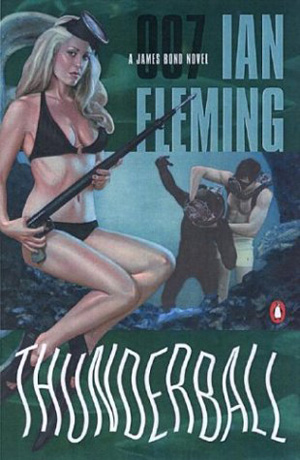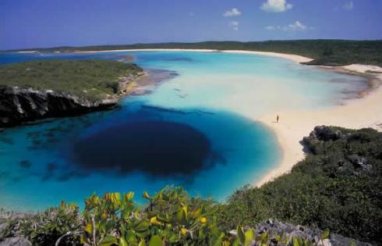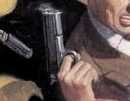|
The Shadower - Ian Fleming's Thunderball

'Blofeld - leader of the terror organization SPECTRE - is holding the
world to ransom. He has stolen two powerful atomic weapons and will
destroy a major city if his demands for £100,000,000 are not met.
Given one week to find the missing bombs, Bond goes to the Bahamas,
where he encounters sultry Domino - mistress of Blofeld’s right
hand man, Emilio Largo. By getting closer to her, 007 hopes to find out
more about Largo’s hidden operation among the coral reefs, but
soon finds himself getting deep into shark infested waters...'
Thunderball is the ninth James Bond novel written by Ian Fleming and
was originally released in 1961. The plot revolves around 'the Big
Affair' - the theft of two atomic bombs - masterminded by SPECTRE
'No.1' Emilio Largo - from NATO by Blofeld and SPECTRE. A ransom is
sent to the British and American governments warning that if one
hundred million dollars is not paid in a week then a 'major' piece of
property will be destroyed, followed by a famous city.
James Bond is duly sent to the Bahamas to investigate...
One of the more solid Bond books - if not one of the best - Thunderball
is an interesting entry in the series with locations stretching from
London to Sussex to Paris to the Bahamas. It's notable for the
introduction of Blofeld and SPECTRE (SMERSH has been dismantled by
Krushchev) and the involvement Kevin McClory in the story which led to
years of legal wrangles and the 1983 'renegade' James Bond film Never
Say Never Again. The book begins with Bond being sent to plush Sussex
health farm Shrublands after being deemed unfit by a medical and it's
hardly surprising with his lifestyle! "How much stone-ground whole
wheat do you eat?" asks M. "How much yogurt? Uncooked vegetables, nuts,
fresh fruit?" "Practically none," replies Bond amused by the question.
Bond's stay at Shrublands is good fun ('Bond walked thoughtfully down
the trim narrow drive and smelled the musty smell of the laurels and
laburnums. Could he stand it? Was there any way out of this hell-hole
short of resigning from the service?') and includes a couple of
somewhat sadistic encounters with Count Lippe - a shady character who
Bond becomes intrigued by when he notices a strange tattoo which is
linked to a criminal society in Hong Kong. Thunderball has trademark
moments of Ian Fleming sadism scattered through the book with
electrocutions, burns, barracudas, and assorted deaths.
Thunderball certainly has a grand scale plot and the book is at its
best when working on the level of an old fashioned adventure with
shenanigans involving a hijacked Villiers Vindicator Bomber (and
bombs), double-dealing and murder between criminals, Largo's hydrofoil
- the 'Disco Volante', scuba-diving, frogmen and sharks. 'Now he swam
very slowly, watching the white explosion of the moon on the surface
contract and define itself,' writes Fleming. 'Once he looked down.
There was no sign of the barracuda. The long hull of the ship grew out
of the upper mists and took shape, a great Zeppelin in the water.' The
sense of location, beaches, and underwater stuff gives Thunderball a
sultry and atmospheric flavour at times and its possibly the best
element in the book.

Fleming's penchant for inserting factual information (presumably from a
textbook he had to hand at the time) does seem a tad jarring at times,
especially stuff like - 'Saliva contains ptyalin. Thorough mastication
creates ptyalin which helps to convert starches into sugar to supply
energy for the body. Ptyalin is an enzyme. Other enzymes are pepsin,
found in the stomach, and pepsin and erepsin found in the intestine.
These and other enzymes are chemical substances that break up the food
as it passes through the mouth, the stomach and the digestive tract.'
Factual detail like this just seems lifeless and forced and parts of
the book have of course dated. There is a bit where Bond threatens (in
a jokey manner) to give Miss Moneypenny such a spanking she'll have to
do her typing 'off a block of Dunlopillo.' I'm not sure you could away
with that type of banter today although Moneypenny remarks that Bond
will be in no condition to spank anyone after two weeks of nuts and
lemon juice at Shrublands!
We learn a few more bits about James Bond in this one. He jumped from
the Arlberg Express around the time of the Hungarian uprising and
dislikes it when M sends him to the Bahamas because he feels like he'll
be away from the action. Bond is a trained killer but he has a nice
sense of humour and a love of the high life. We get some nice
descriptions of Bond in the book - 'The girl looked him up and down. He
had dark, rather cruel good looks and very clear, blue-grey eyes. He
was wearing a very dark blue lightweight single-breast suit over a
cream silk shirt and a black knitted silk tie. Despite the heat, he
looked cool and clean.' Interestingly, Bond comments that as a British
Agent it feels like the war hasn't ended. 'Berlin, Cyprus, Kenya, Suez,
let alone these jobs with people like SMERSH that I used to get tangled
up in.'
Largo makes for an interesting villain and he has a classic game of
chemin de fer game with Bond at Nassau. His outward mask slips when
Bond makes a comment about a 'spectre on his shoulder' in a great
moment. We get a sense of these two confident men - who are both hiding
who they really are - sparring for weaknesses and information. Largo
has the 'ruthlessness of a Himmler' and has always seen the essential
step ahead that would have been hidden from lesser men. 'He was the
epitome of the gentleman crook - a man of the world, a great womanizer,
a high liver, with the entree to cafe society in four continents, and
the last survivor, conviently enough of a once famous Roman family
whose fortune, so he said, he inherited.'
Dominetta 'Domino' Vitali (who isn't actually in an awful lot of the
novel) is a decent if not classic Bond girl but she does have a very
dramatic entrance and gets to wield a gadget when a Geiger counter is
disguised as a camera. 'Two features modified the clean-cut purity of
line,' writes Fleming describing her. 'A soft, muddled Brigette Bardot
haircut that had escaped from under the straw hat in endearing
disarray, and two deeply cut but soft dimples which could only have
been etched by a sweet if rather ironic smile that Bond had not yet
seen. '
Felix Leiter is used quite well in the book and his encounters with
Bond are good fun. He has some nice lines too - 'Authentic blonde!' -
and brings humour to the book. Blofeld is of course a great invention
and it's always interesting to read more about SPECTRE and how they
operate. Fleming's information about SPECTRE is very inventive and
absorbing. Blofeld himself, who remains quite a shadowy presence in the
book, is painted as fat and asexual with a very effective way of
suppressing dissent at board meetings! He places a violet-scented
'cachou' in his mouth to sweeten his breath before he does something
unpleasant, like kill people for instance - 'Blofeld tucked the cachou
under his tongue and began to talk in a soft, reasonant, and very
beautifully modulated voice.' I enjoyed the depiction of the SPECTRE HQ
in Paris.
Thunderball perhaps fizzles out a little at the end but the best parts
of the book for me are the Bahamas and Shrublands sections. In a way
the book highlights both the strengths and weaknesses of Fleming and is
a middle-ranking entry in the literary series.
At its best though Thunderball is a lot of fun and includes some nice
moments of escapism and adventure and a languid tropical atmosphere.
- Jake

c 2009
Alternative 007
|

|

